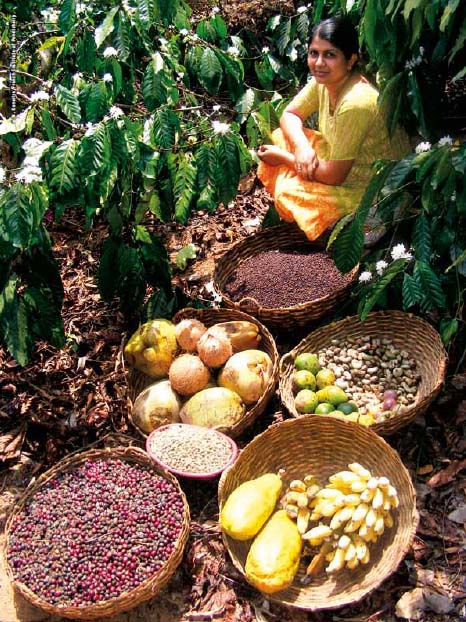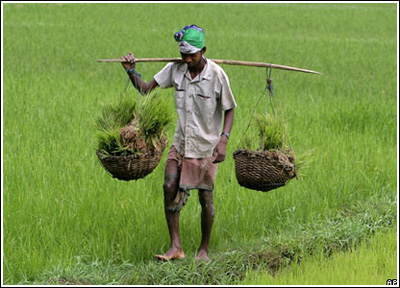/regions/world
World
IDRC invites research awards for training in research management and grant administration – Apply by September 12, 2011
Posted on 27 Aug, 2011 11:10 AM![]()
International Development Research Centre (IDRC) supports applied research to find local solutions that will have lasting impacts on communities around the world.
The IDRC research awards aim to provide exposure to research for international development through a program of training in research management and grant administration under the guidance of IDRC program staff.
This competition is for positions starting in early 2012. The number of awards varies each year. Approximately 15 awards will be offered in 2012.
Payments for ecosystem services and food security – A report by Food and Agriculture Organisation
Posted on 24 Aug, 2011 06:08 PM Changing climate, loss of native forests, disappearance of biodiversity, water shortages, desertification, the reduction of natural soil fertility — all add to the scenario of a world with increasingly complex environmental challenges.
Changing climate, loss of native forests, disappearance of biodiversity, water shortages, desertification, the reduction of natural soil fertility — all add to the scenario of a world with increasingly complex environmental challenges.
The concept of Payment for Ecosystem Services (PES) has emerged as a challenge to the all-too-prevalent tradition of taking the Earth’s natural resources for granted. PES highlights a global continuum, illustrating the relationship between our lifestyles, the demands associated with our production and consumption patterns, and the effects those demands have on close or distant ecosystems.
Sanitation as a business - A new spin on the challenge of sanitation operation and maintenance - A paper by Water for People
Posted on 24 Aug, 2011 11:34 AMThis paper published by the Water for People describes Sanitation as a Business, an innovative approach to operation and maintainance challenges in household sanitation improvements, by describing the case of the implementation of the approach in the context of Malawi, by Water for People. The paper argues that programs that build latrines have consistently struggled to have impact or reach scale, and have often distorted the market environment in ways that have undermined future sanitation development.
The paper emphasises the relevance of this approach in the context of developing countries such as India by stating that the world would not be able to achieve even half of the Millennium Development Goals for sanitation at current rates of installation and consequently is projected to miss the sanitation MDG by more than 700 million people. Among the twenty two percent of those without access to improved sanitation, the greatest challenge remains in Asia and India in particular.
Water.org invites applications for the post of Program Officer - Apply by September 7th, 2011
Posted on 23 Aug, 2011 05:57 PM
Water.org is a dynamic, rapidly growing international organization addressing the global water supply crisis. It is committed to providing clean drinking water and improved sanitation to communities in developing countries. Working in partnership with donors, beneficiaries and other stakeholders, Water have helped people around the world develop accessible, sustainable, community-level water and sanitation (watsan) services. Water.org currently operates in several countries, including Ethiopia and Kenya, and is considering other countries for expansion.
Background:
Water.org has pioneered its WaterCredit initiative over the last several years, which enables clients of microfinance institutions (MFIs) to improve the access, quantity, and quality of their families' water and sanitation services.
World Water Week training courses on water management, Cap-Net/UNDP – Stockholm International Water Institute, August 19-20, 2011, Stockholm
Posted on 11 Aug, 2011 10:32 AM
Organizer: Cap-Net/UNDP and Stockholm International Water Institute
Venue: Stockholm International Water Institute, Drottninggatan, 33, 111 51 Stockholm, Sweden
Troubled waters - Climate change, hydropolitics and transboundary resources – A report by TERI and The Henry L Stimson Center
Posted on 02 Aug, 2011 07:38 PMThis report is a part of Stimson’s Regional Voices: Transnational Challenges project and provides valuable cross-regional and multidisciplinary insights into the complex issues surrounding transboundary water resources and climate change. It examines the environmental dangers and policy dilemmas confronting the sustainable management of shared water resources in a warming world.
Kailash sacred landscape conservation initiative - Feasibility assessment report by ICIMOD
Posted on 25 Jul, 2011 03:19 PM This publication by International Centre for Integrated Mountain Development (ICIMOD) deals with Kailash Sacred Landscape Conservation Initiative (KSLCI), a project that seeks to conserve and sustainably manage a highly unique and special landscape through the application of trans-boundary ecosystem management approaches.
This publication by International Centre for Integrated Mountain Development (ICIMOD) deals with Kailash Sacred Landscape Conservation Initiative (KSLCI), a project that seeks to conserve and sustainably manage a highly unique and special landscape through the application of trans-boundary ecosystem management approaches.
This region, like much of the rest of the Hindu Kush-Himalayas, faces many challenges, not the least of which are global warming, globalisation and environmental degradation. The Kailash region is considered sacred to five major religions and to a large number of people in Asia and throughout the world. This area is historically, ecologically, and culturally interconnected and is the source of four of Asia’s most important rivers.
The KSLCI is an attempt on the part of the three neighbouring countries of India, China and Nepal to join hands to help preserve the unique biological diversity, the many ecosystem goods and services, and the value-based cultural heritage of one of the most revered and sacred landscapes in the world.
APN's call for proposals under ARCP programme and CAPaBLE programme - Apply by July 29, 2011
Posted on 15 Jul, 2011 03:15 PMCountries within the Asia‐Pacific region support more than half of the world’s population and changes in the Earth’s bio geophysical system are clearly impacting the societies and economies of these countries.
The APN is inviting proposals under two separate programmes, the ARCP Programme and the CAPaBLE Programme, for funding from April 2012, and is able to provide a limited amount of financial support1 for research and capacity development activities that fall within its areas of interest.
Why India's 'growth' focus is ignoring the food access question - Article from Infochange India
Posted on 14 Jul, 2011 11:41 AMArticle and Image courtesy: Infochange India
Author: Rahul Goswami
Celebrating the fact that per capita agricultural income is increasing faster than overall per capita income, the government is targeting 4% growth in agriculture in the Twelfth Plan period. But this is a rosy view that does not stand up to scrutiny.
